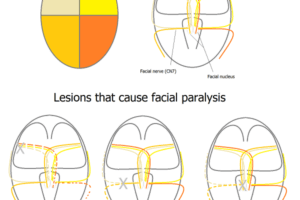Contralateral: adjective; on the opposite side of.
Used in descriptions of how two anatomical or pathological structures are related.
Examples:
1. “a lesion of the motor cortex produces contralateral weakness” means that an injury to the part of the cerebral cortex that controls movement produces weakness in the muscles of the body on the opposite side of the injury (eg. injury in the left motor cortex would cause weakness in the right arm and leg).
2. “the spinothalamic tract carries contralateral pain and temperature fibers” means that the nerve fibers traveling in the part of the spinal cord known as the spinothalamic tract carries sensory information from the opposite side of the body; so the tract on the right carries pain and temperature information from the left side of the body while the tract on the left carries information from the right side of the body.
See for comparison: ipsilateral.

